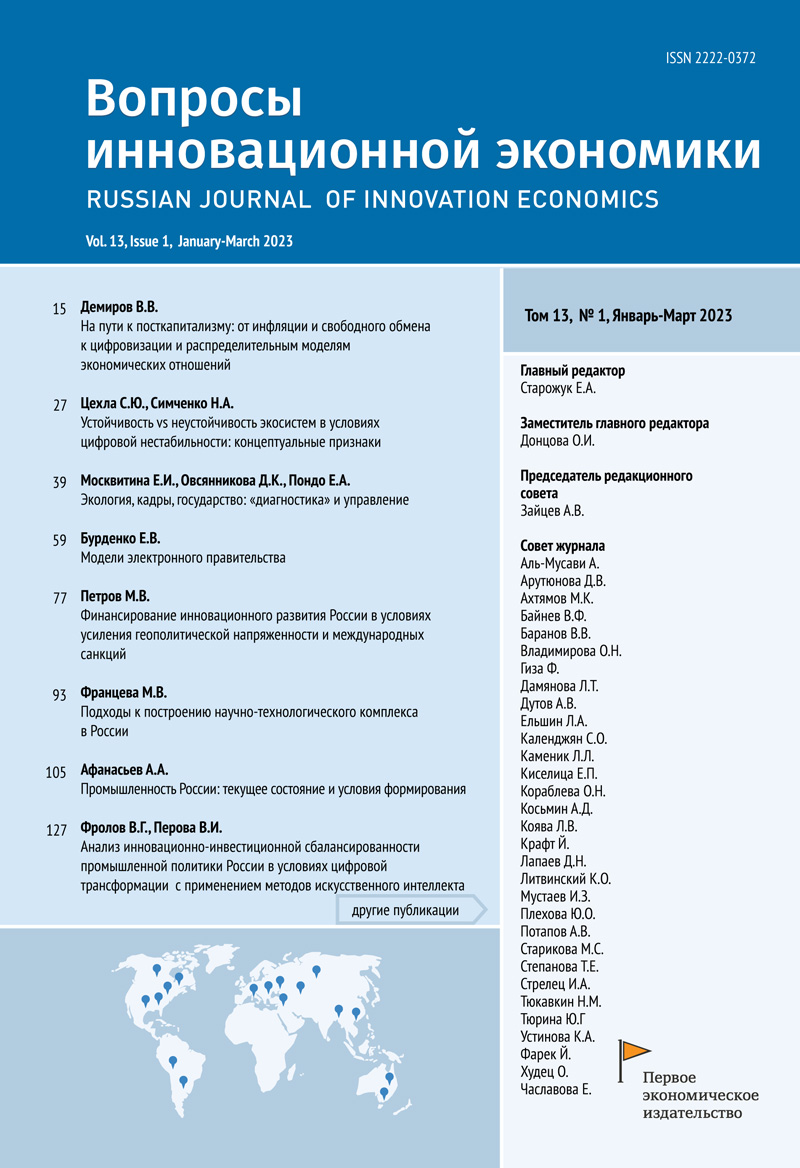An empirical study of research grant support in Russian universities
- Authors: Lavrinenko Y.B.1, Tinyakova V.I.2, Shishkina L.A.3
-
Affiliations:
- Voronezh State Technical University
- State University of Management
- Voronezh State Agricultural University
- Issue: Vol 13, No 1 (2023)
- Pages: 471-484
- Section: Articles
- URL: https://journals.eco-vector.com/2222-0372/article/view/608114
- DOI: https://doi.org/10.18334/vinec.13.1.117296
- ID: 608114
Cite item
Abstract
The results of the authors' research make a certain contribution to the study of the problem of obtaining grants from the Russian Science Foundation and the President of the Russian Federation allocated to support and develop the universities' scientific and innovative activities. A set of Russian universities, which are the most frequent recipients of grants, was the object of the study. The authors carried out a correlation analysis between the number of grants received by these universities and their performance indicators, such as the average score of the Unified State Exam, the number of publications, the proportion of teaching staff with academic degrees, the average salary and a number of other indicators for the period 2020-2021. The hypothesis about the concentration of state grant support in a small group of universities and the maximum concentration of grants for universities in two cities of federal significance Moscow and St. Petersburg, as well as the hypothesis about the existence of a relationship between the number of grants received by universities and the quality of publications affiliated with them, was tested. The results of the authors' research are of interest to the heads of scientific departments of universities, as well as to the authorities that form the scientific policy of the state.
About the authors
Yaroslav Borisovich Lavrinenko
Voronezh State Technical University
Email: yaroslav_lav1@bk.ru
Viktoriya Ivanovna Tinyakova
State University of Management
Email: tviktoria@yandex.ru
Larisa Aleksandrovna Shishkina
Voronezh State Agricultural University
Email: kz2009kzaf@gmail.com
References
- Antonelli C., Crespi F. Matthew Effects and RD Subsidies: Knowledge Cumulability in High-tech and Low-tech Industries. Working Paper 11/2011. Rome: University ‘Roma Tre’. - 2011
- Arora A., Gambardella A. The impact of NSF support for basic research in economics // Annales d’Economie et de Statistique. – 2005. – № 79-80. – p. 91-117.
- Lazeur E.P. Incentives in Basic Research // Journal of Labour Economics. – 1997. – № 1-2. – p. S167–S197.
- Smith R. Peer review: A flawed process at the heart of science and journals // Journal of the Royal Society of Medicine. – 2006. – № 4. – p. 178-182. – doi: 10.1258/jrsm.99.4.178.
- World University Rankings. Times Higher Education. [Электронный ресурс]. URL: https://www.timeshighereducation.com/ (дата обращения: 12.12.2022).
- Иванов К.С. Как пилят деньги в новом Российском научном фонде // Уральский геологический журнал. – 2014. – № 5(101). – c. 3-9.
- Лавриненко Я.Б., Тинякова В.И. Оценка влияния государственного финансирования высшего образования на инновационную активность университетов. / В книге: Стратегическое управление устойчивым развитием экономики в новой реальности. - СПб.: ПОЛИТЕХ-ПРЕСС, 2022. – 721-747 c.
- Миндели Л.Э., Либкинд А.Н., Маркусова В.А. Влияние грантового финансирования на эффективность научных исследований в высшей школе // Вестник Российской академии наук. – 2014. – № 12. – c. 1080-1089. – doi: 10.7868/S0869587314120111.
- Мониторинг деятельности организаций высшего образования. Главный информационно-вычислительный центр МИРЭА – Российский технологический университет. [Электронный ресурс]. URL: https://monitoring.miccedu.ru/?m=vpo/ (дата обращения: 05.12.2022).
- Научная электронная библиотека eLIBRARY.RU. [Электронный ресурс]. URL: https://elibrary.ru/ (дата обращения: 01.12.2022).
- Поиск проектов. Российский научный фонд. [Электронный ресурс]. URL: https://rscf.ru/project/ (дата обращения: 05.12.2022).
- Симачёв Ю., Засимова Л., Курбанов Т. Грантовая поддержка фундаментальных исследований в России: уроки первого конкурса РНФ // Форсайт. – 2017. – № 11(4). – c. 74-83. – doi: 10.17323/2500-2597.2017.4.74.83.
- Смирнов В.А. Эффективность грантовой поддержки российских социально ориентированных некоммерческих организаций (на примере Фонда президентских грантов) // Социологические исследования. – 2020. – № 9. – c. 79-89. – doi: 10.31857/S013216250009619-3.
- Сморчкова Л.Н. Реорганизация научных фондов: перспективы государственного финансирования научно-исследовательских работ посредством грантов в России и его правовое регулирование // Современное право. – 2021. – № 8. – c. 38-43. – doi: 10.25799/NI.2021.90.96.006.
- Совет по грантам Президента Российской Федерации. [Электронный ресурс]. URL: https://grants.extech.ru/ (дата обращения: 12.12.2022).
- Хлунов А.В. Куда ушли 180 миллиардов рублей Российского научного фонда. Russiancouncil.ru. [Электронный ресурс]. URL: https://russiancouncil.ru/analytics-and-comments/comments/kuda-ushli-180-milliardov-rubley-rossiyskogo-nauchnogo-fonda/ (дата обращения: 01.12.2022).
Supplementary files









